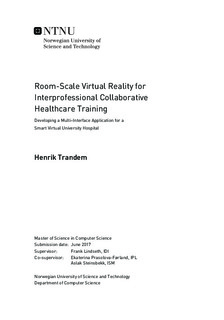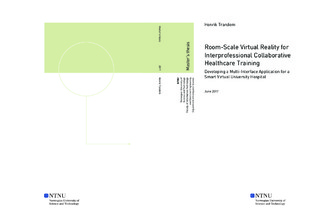| dc.description.abstract | This master's thesis investigates how room-scale virtual reality can be combined with traditional interfaces to facilitate collaborative interprofessional healthcare training. Students from medical- and nursing professions rarely get to practice interprofessional training and to deal with this issue; collaborative virtual environments are used to simulate patient care, procedural training, and collaborative training. Many of the existing solutions are outdated, however, and room-scale virtual reality could be just what the users need to improve the existing solutions. However, room-scale solutions are not very common today, and as such, other interfaces also need to be supported. A key research point has therefore been how different devices and interfaces need to adapt for them to be included into a smart university hospital. As the widely-used architectures utilized today do not support room-scale VR, a prototype application with a new architecture has been developed from the ground up, using the Unity game engine. The requirements of the application have been based on a role-playing case from an existing solution. The prototype and the existing solution were tested by the same group of people, and the results showed that room-scale virtual reality increased realism and immersion for the users. Additionally, supporting several interfaces in the same environment proved to be a challenging task. Finally, the thesis concludes that a multi-interface application used for interprofessional collaborative healthcare training can be developed in a few months, given that not all interaction methods provide the same functionality. It also seems evident that room-scale virtual reality makes procedural tasks much more lifelike.
Keywords: Room-scale, virtual reality, collaborative training, healthcare training, development, prototyping, multi-interface, adaptation, smart virtual university hospital | |

